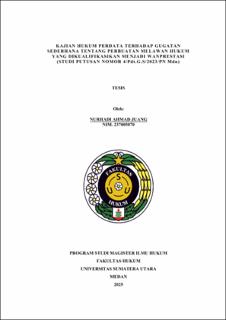| dc.description.abstract | Unlawful Acts and Breach of Contract are two things that always arise in civil cases. These two things often intersect and overlap in terms of their qualifications and resolution at the level of judicial practice. One case that illustrates this is Desicition No. 4/Pdt.G.S/2023/PN Mdn, in which the court hears a claim based on an unlawful act, but the judge ultimately qualifies it as a Breach of Contract. There are also 3 (three) decisions reflecting the disparity in resolving cases involving Unlawful Acts and Breach of Contract. This situation becomes an assumption regarding legal uncertainty and inconsistency in court decisions, both materially and formally, within the Civil Procedure Law. The problem of this research is how is the legal certainty of the rules for qualifying Unlawful Acts and Breach of Contract in Indonesia, how is the settlement process at the level of judicial practice, and wheter Decision No. 4/Pdt.G.S/2023/PN Mdn is in accordance with the Civil Procedure Law procedures or not.
This research uses a normative legal method based on applicable legal norms, with a statutory regulatory approach in this case, especially the Civil Code (KUH Perdata), Simple Lawsuit of Supreme Court Regulation (Perma), a conceptual approach and a case approach, which in this case are contained in 4 (four) decisions. Supported by data collection tools and techniques in the form of interviews with informants, namely the Medan District Court Judge and Advocates in order to enrich and strenghthen the research data.
The conclusion of this research is that the current regulations governing the qualification of Unlawful Acts and Breach of Contract in Material Civil Law in Indonesia, which are currently still regulated in the Civil Code, do not ensure legal certainty. There are 3 (three) weakneeses in the current rules on the qualification of Unlawful Acts and Breach of Contract, which then cause legal uncertainty. The process of resolving Unlawful Acts and Breach of Contract cases at the level of current judicial practice still causes disparities in desicions caused by differences in understanding the concept in terms of resolving cases that are casuistic in nature. As for Desicion No. 4/Pdt.G.S/2023/PN Mdn concerning a simple lawsuit for Unlawful Acts that is qualified and decided to be a substantial material Breach of Contract is in accordance with current positive law. However, in terms of procedural law, this decision is concidered inapproriate as it has violated the principle of a passive judge and the principle of ultra petitum partium or ultra petita. | en_US |


